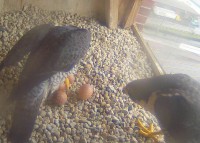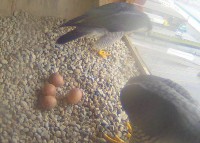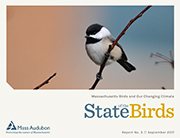Lawrence Peregrines: egg turning
April 26, 2018 in In the Nest Box, lawrence peregrines, Peregrine Falcons Eastern Massachusetts, Peregrine Falcons Massachusetts
Light Rain 56°F wind from SE at 3MPH. Sunrise time 5:46 AM.
The forecast calls for showers likely, mainly before 8am. Areas of fog before 9am. Otherwise, cloudy, then gradually becoming mostly sunny, with a high near 67. Light and variable wind becoming west 9 to 14 mph in the morning. Chance of precipitation is 70%. New precipitation amounts between a tenth and quarter of an inch possible.
 Checked in this morning just after 6:20 AM to find the male incubating. He was sitting quietly and barely moving. At 7:08 AM he departs, and returns minutes later, turns the eggs, shakes, rocks, and rolls, then nestles in on the eggs. At 7:14 AM the female flies in, and the male rises and departs. The female quickly settles on the eggs, engages in making low level chittering sounds along with active head turning. Ten minutes later she departs, and returns after ten minutes. Lots of in and out this morning.
Checked in this morning just after 6:20 AM to find the male incubating. He was sitting quietly and barely moving. At 7:08 AM he departs, and returns minutes later, turns the eggs, shakes, rocks, and rolls, then nestles in on the eggs. At 7:14 AM the female flies in, and the male rises and departs. The female quickly settles on the eggs, engages in making low level chittering sounds along with active head turning. Ten minutes later she departs, and returns after ten minutes. Lots of in and out this morning.
If you watch closely, you regularly see either adult get up, move around, then settle back down on the eggs. Sometimes they do this just to get into a different position, and maybe to give their legs a bit of a stretch, but often what they’re doing is turning the eggs. They turn the eggs to ensure that they get evenly heated. If the eggs aren’t heated evenly they may not develop, or they may develop abnormally. It’s also possible for the developing egg to stick to the inside of the eggshell. Turning the eggs keeps the egg membrane from sticking to the sides of the shell. Falcons turn the eggs using their bills and their feet. As you can imagine, they turn their eggs very carefully! If you’re watchful and lucky, you may get to see a picture of them turning the eggs. It may look like they’re stepping on the eggs or pecking at them, but now you know what’s really going on.
 Turning is an essential for successful hatching of avian embryos. One of the most important roles of incubating parents, is to turn the eggs in the nest box. Regular turning of eggs is known to be critical for normal development. The most common explanation is to prevent the embryo from adhering to the inner shell membrane.
Turning is an essential for successful hatching of avian embryos. One of the most important roles of incubating parents, is to turn the eggs in the nest box. Regular turning of eggs is known to be critical for normal development. The most common explanation is to prevent the embryo from adhering to the inner shell membrane.
Literature cited:
Imprints Blog, The Journal of the Rfalconcam, Rochester Falcon Cam. The Genesee Valley Audubon Society is the local chapter of the National Audubon Society in Rochester, NY. GVAS sponsors the Rochester Falconcam (Rfalconcam) as part of their education and awareness programs.
Deeming, Charles (2002) Avian incubation: behaviour, environment and evolution. Oxford University Press, Oxford. ISBN 0198508107
